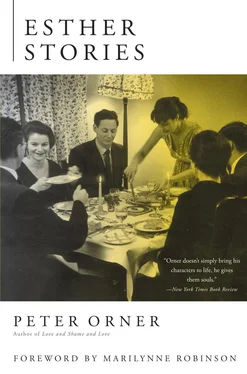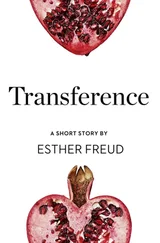“Esther’s dead,” I say.
“You think I was born last Tuesday? I know Esther’s dead. A year ago this month she passed.”
“Nana didn’t want to upset you.”
“Upset herself! The business of that! I raised the girl. Upset me!”
“Nana was so devastated. She couldn’t even think—”
“You’re telling me about it? Now she calls me twice a week to cry about it. But don’t think I didn’t give her a taste of lip for not telling me about the funeral. What do you want to protect an old woman from? What haven’t I seen already? You’d think nobody ever died on me, with that woman calling me with news that’s not news anymore.”
“That poor girl’s life,” Mag says. “Ravaged.”
“Nana couldn’t even walk into the funeral home,” I say. “We had to hold her up. You know what it would take for her to accept help like that.”
Olivia nods slowly and laughs a little. “Sometimes she went around like she never had a housekeeper her whole life. That woman. I can see her. Grieving enough for everybody.”
“She calls to talk about Esther?”
“Yes, twice a week. Some days I put the phone down on the counter and just let her go on. My ears get tired. I do the crossword. Ask Mag. Sometimes three times a week.”
“It’s true,” Mag says.
“But enough of that. Enough.” Olivia whaps my knee. “Talk about you.”
Mag brings tea. She’s a large woman with a soft step across the carpet; she loves to have guests. Not to talk to them, but to serve them, watch them, anticipate them. Olivia used to talk to her on the kitchen phone for hours while Mag uh-huhed. I know, because I used to listen from my grandfather’s study. And if I was hungry I’d pick up the phone — then hang it up right away, pick it up, hang it up, pick it up. I did it till Olivia started hollering across the house that if I dared do that one more time she’d call her lawyer on me. Her lawyer, my father.
“You look like you did when I was twelve.”
“Don’t lie to this face, Leo. I’m so old. I never thought people got so old.”
“You don’t look so old.”
“Old as your grandpapa. Born in the same month. August 1909.”
“He’s back to fighting the Japanese full-time.”
“Well, that man. That’s what he was about. That war. Only thing that didn’t bore Mr. Burman was that over-with war.”
“Esther,” I say, “do you mind—”
“Uh-oh, Mag. Here he goes. Don’t I always say this one’s the poker. Always meddling in boxes. Sniffing around in the backs of drawers, my purse. Always eavesdropping on people. Used to drive his grandmother to howling for the police. Leo at her bedroom door listening to her on the phone, with his ear pressed up against the bottom of one of her good cocktail glasses.”
“When Esther was pregnant—”
“What kind of boy listens to two old gossips talking about nonsense?”
“There’s something I think I remember. I just want to know if—”
“Oh, Leo, please. Leave her be. You waste time.”
Olivia turns to her sister. “She used to call herself the swelly-belly girl. Used to take the train out to us and walk around rubbing her stomach like a basketball.”
“I remember you telling me,” Mag says, handing me the plate again.
With my free hand I tug Olivia’s arm. “The time when I found that cat. Wasn’t Esther in the house that day?”
“That kitty!” Olivia grabs hold of Mag, who has tried to escape to the kitchen for more of everything. “Listen, honey. We had three cats already and Mr. Burman hated every single one of them. He’d howl about wringing their necks every time one of them brushed his ankle. And this one goes outside and hauls in another one.”
“It was just sitting there under the swings.”
“Most adorable thing you ever saw. One gray paw. Well, the other cats are already starting to hiss, so I put the kitty in Mrs. Burman’s downstairs powder room, with a heap of dirt.”
“For litter,” Mag says. “I think I heard this story. And then the Grandpa comes home early from the bank.”
“And he had to go to the bathroom,” I said. “Came in, didn’t say hello, marched straight to the bathroom.”
Olivia laughs. “Yeah, but we didn’t know that yet. That man was always barging by people with his head down like that. Man moved through houses like Dick Butkus. That day was no different. How could I know he was going to use Mrs. Burman’s powder room? He never set foot in there. Room was smaller than he was. But something made him, and he opens the door and starts hollering about the pile of dirt like he never saw dirt before. Then he saw kitty hiding behind the toilet and yelled, ‘Ollie — there’s a goddamn skunk in the bathroom.’ ”
“Right. He went a little berserk.”
“And then—”
“Esther. You remember?”
She turns to me and her eyes aren’t laughing anymore. “Leo—”
“But she was there?”
“Yes. I remember. She shouted at everybody to come into the living room. She said, Forget about your cats, folks. Forget the skunks, everyone…”
I nod.
“You got it,” Olivia says, because she knows I hear it, too. “That girl saying, ‘This baby’s dancing, dancing up a storm.’ And she stood up on the couch and let us feel her, and maybe it was true, but I didn’t feel anything. ‘Dancing the cha-cha,’ she said. And your papa standing by the door in his tie. He even smiled. ‘The cha-cha, my ass,’ he says.”
“The turkey trot,” Mag says, and guffaws. “That’s some nuthouse over there.”
“She said cha-cha?” I ask.
“Like it was this morning,” Olivia says.
We sit for a while, the three of us, looking at the carpet, at the pictures on the coffee table. Boys in school photographs against powder blue backgrounds, canned smiles. Then Olivia whispers like Mag’s in the kitchen and can’t hear us, as if this is something not for Mag’s ears, even though she’s sitting right there with us. All she wanted was to kiss that baby alive. And I look at Mag, who’s staring at one of the pictures as if all this reminds her of someone else.
The scuttling together people do by a window during a storm. We are like that. The funeral will be closed casket. This is the private family viewing. My father steps closer and looks at her. Esther’s hands are twined so tight they make a single fist. Then he removes a hand and touches her. This sister in beige taffeta, heavy makeup, a wig. He does this. It’s a part of your story even if you don’t want it. He takes his hand out of his pocket and reaches into the casket, and at least one finger touches your fist. Skin that never met in life. My grandmother presses her wet forehead into the back of my neck and murmurs.
Knuckles meet the sorority house door, but softly. Though he’s been running, he doesn’t want to knock yet. The door hard and looming beneath his fingers. It’s this moment he wants. The almost seeing her, not the seeing. Years later, after the first of many ends, Lloyd will still conjure this beautiful almost. His hesitant approach down the long corridor toward their apartment, his fear, his shoes noiseless across the carpet. The unlocking of their door. Her emergence from the bedroom that was never his even when it was his to sleep in. How it all whirls him back. Mrs. Roachwell, Mrs. Roachwell, I’m coming. Tell that boy to stop shaking in his boots! That first burst of Esther into any room.
THEY DIDN’T HAVE a dime. Nobody they knew did either (except their daughter’s husband, Seymour, and he probably stole it); it was 1939. But when Rachel Shlansky wanted something, it was only a question of when. So they gave their store away for a song—“Ten Cents a Dance,” Louie crooned — and moved south to Hot Springs, Arkansas, where they opened a small café on East Malvern, around the corner and three blocks down from Bathhouse Row. Rachel waited on the tables. Louie cooked behind a screen so people couldn’t see his shakes.
Читать дальше












